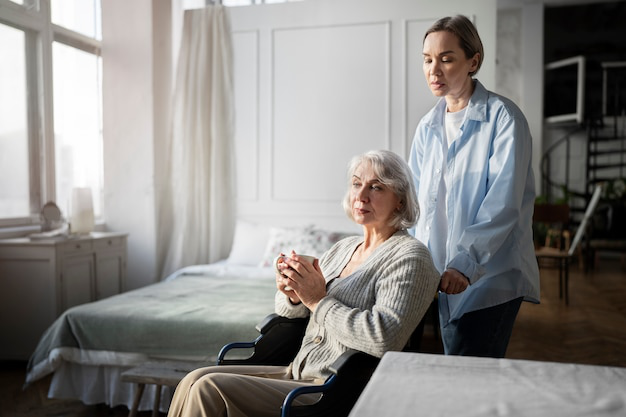As seniors age, they often require additional support to maintain their independence and quality of life. While nursing homes have traditionally been a go-to option for long-term care, more families are now turning to in-home care services as a preferred alternative. Home care allows seniors to receive personalized assistance while remaining in the comfort of their own homes. This blog explores the key reasons why in-home care is a better option compared to nursing homes.
1. Comfort and Familiarity
One of the biggest advantages of home care is that seniors can remain in their own homes. Familiar surroundings provide emotional security and help reduce feelings of anxiety and disorientation. Many seniors have spent decades in their homes, making it a place filled with cherished memories. Staying at home allows them to maintain a sense of normalcy and comfort, which can contribute positively to their well-being.
On the other hand, moving to a nursing home often requires drastic lifestyle changes. Seniors must adapt to new routines, a different environment, and unfamiliar people, which can be stressful and overwhelming. Home care services provide assistance while allowing seniors to continue living in a familiar and beloved setting.
2. Personalized Care and Attention
In-home care offers a level of personalization that nursing homes simply cannot match. Caregivers provide one-on-one attention tailored to the senior’s unique needs, preferences, and daily routines. Whether it’s meal preparation, medication reminders, or mobility assistance, home care professionals create a customized care plan that ensures the best possible support.
Nursing homes, by contrast, typically have high staff-to-resident ratios, making it difficult for caregivers to provide individualized attention. This can lead to seniors feeling neglected or waiting longer for essential care.
3. Enhanced Independence
Seniors often fear losing their independence when they transition to a nursing home. With in-home care, they can maintain control over their daily activities, such as choosing what to eat, when to wake up, and how to spend their day. This level of autonomy is crucial for mental and emotional health.
In contrast, nursing homes operate on strict schedules, with set meal times, activity plans, and visiting hours. While these structures may provide organization, they often limit personal freedom and choice.
4. Better Emotional and Mental Well-Being
Loneliness and depression are common concerns among seniors, particularly those in institutional settings. In-home care helps combat these issues by offering consistent companionship. Caregivers engage seniors in meaningful activities, conversations, and hobbies, helping them stay socially active and emotionally fulfilled.
Nursing homes, while providing group activities, may not always address individual emotional needs. Some seniors struggle with the transition, feeling isolated from family and friends due to restricted visiting hours or location constraints.
5. More Family Involvement
With in-home care, family members can remain actively involved in their loved one’s daily lives. They can visit anytime, participate in care giving, and make important care decisions. This creates a strong support system that enhances the senior’s well-being.
In nursing homes, visiting hours and facility rules can make it challenging for family members to stay engaged in day-to-day care. Additionally, families often have less control over how care is provided.
6. Cost-Effectiveness
Contrary to popular belief, home care can be more cost-effective than nursing home care, especially for seniors who do not require 24/7 medical supervision. Many families opt for part-time or live-in caregivers, which is often more affordable than paying for a full-time nursing home stay.
Nursing homes typically charge a flat monthly fee, which includes housing, meals, and care services. While this may seem convenient, the costs can add up significantly over time. In-home care allows families to pay for only the services they need, making it a more budget-friendly solution.
7. Reduced Risk of Illness and Infections
Nursing homes accommodate multiple residents in shared spaces, increasing the risk of infections and contagious diseases. Seniors with weakened immune systems are particularly vulnerable to outbreaks of illnesses like the flu, pneumonia, or COVID-19.
In-home care minimizes exposure to such risks. Since care is provided in a private home setting, seniors have better control over hygiene and are less likely to come into contact with contagious illnesses.
8. Flexible In-Home Care Options
Home care services are highly flexible, allowing seniors and their families to choose care based on their specific needs. Whether a senior requires assistance for a few hours a day, overnight care, or 24-hour supervision, home care providers offer tailored solutions.
Nursing homes, on the other hand, follow fixed schedules and structured care plans that may not suit every individual’s needs. Some seniors may require occasional assistance rather than full-time institutional care, making home care the better choice.
Conclusion
When considering long-term care options, it’s essential to choose what’s best for the senior’s overall well-being. Home care services provide a compassionate, personalized, and flexible alternative to nursing homes, allowing seniors to age with dignity in their own homes. From enhanced independence to better emotional support, home care offers numerous benefits that improve quality of life.
Maintain a Familiar and Loving Environment for Senior with Home Care Services from Live Easy Home Care
Maintain comfort and security for your loved one with home care services from Live Easy Home Care. Our Bergen County skilled caregivers provide personalized home care, companion care, and 24-hour in-home care, ensuring seniors receive expert support while staying in familiar surroundings. Contact us today!






